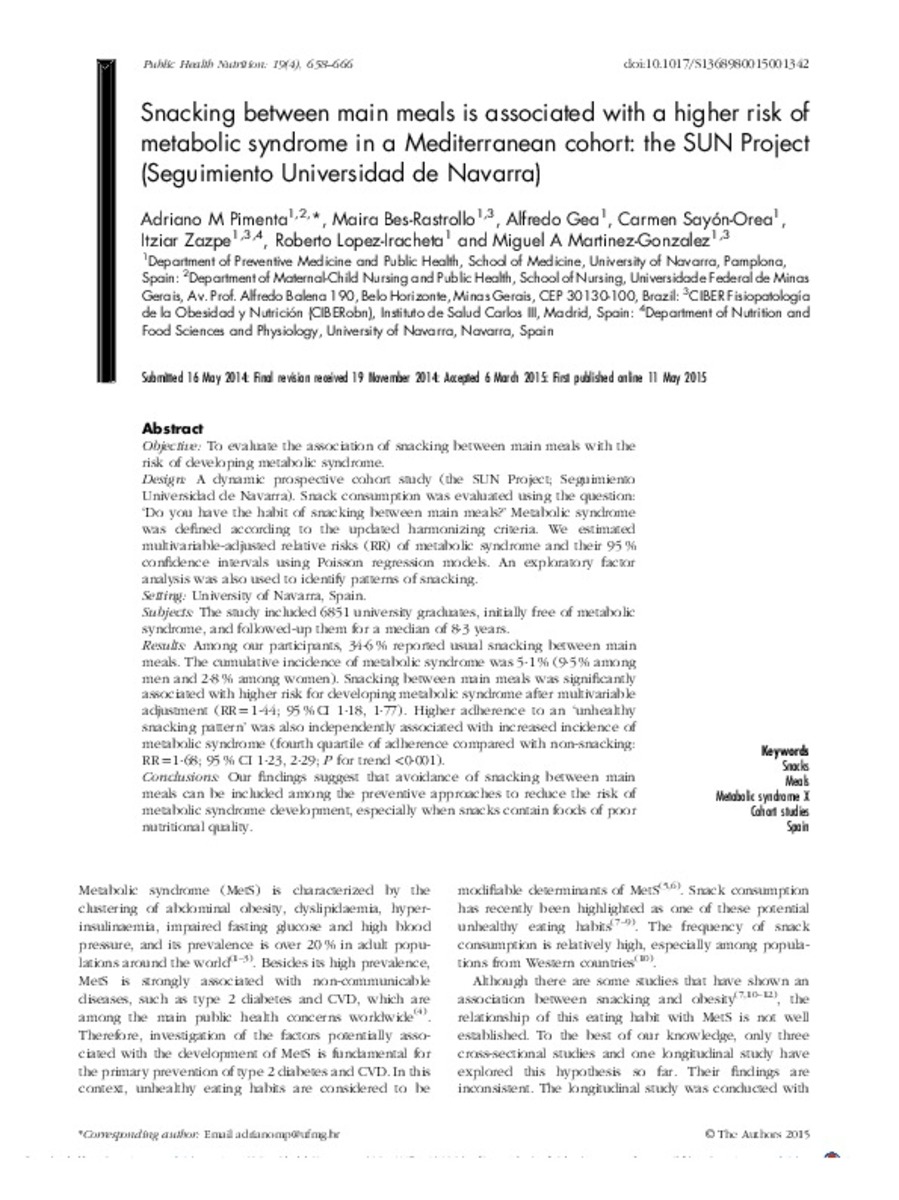Full metadata record
| DC Field | Value | Language |
|---|---|---|
| dc.creator | Martinez-Gonzalez, M.A. (Miguel Ángel) | - |
| dc.creator | Lopez-Iracheta, R. (Roberto) | - |
| dc.creator | Zazpe, I. (Itziar) | - |
| dc.creator | Sayon-Orea, C. (Carmen) | - |
| dc.creator | Gea, A. (Alfredo) | - |
| dc.creator | Bes-Rastrollo, M. (Maira) | - |
| dc.creator | Pimenta, A.M. (Adriano Marçal) | - |
| dc.date.accessioned | 2017-03-10T13:02:13Z | - |
| dc.date.available | 2017-03-10T13:02:13Z | - |
| dc.date.issued | 2015 | - |
| dc.identifier.citation | Pimenta, A.M., Bes-Rastrollo, M., Gea, A., Sayon-Orea, C., Zazpe, I., Lopez-Iracheta, R., et al. Snacking between main meals is associated with a higher risk of metabolic syndrome in a Mediterranean cohort: the SUN Project (Seguimiento Universidad de Navarra). Public Health Nutr 2016 Mar;19(4):658-666. | es_ES |
| dc.identifier.issn | 1368-9800 | - |
| dc.identifier.uri | https://hdl.handle.net/10171/43077 | - |
| dc.description.abstract | OBJECTIVE: To evaluate the association of snacking between main meals with the risk of developing metabolic syndrome. DESIGN: A dynamic prospective cohort study (the SUN Project; Seguimiento Universidad de Navarra). Snack consumption was evaluated using the question: 'Do you have the habit of snacking between main meals?' Metabolic syndrome was defined according to the updated harmonizing criteria. We estimated multivariable-adjusted relative risks (RR) of metabolic syndrome and their 95 % confidence intervals using Poisson regression models. An exploratory factor analysis was also used to identify patterns of snacking. SETTING: University of Navarra, Spain. SUBJECTS: The study included 6851 university graduates, initially free of metabolic syndrome, and followed-up them for a median of 8·3 years. RESULTS: Among our participants, 34·6% reported usual snacking between main meals. The cumulative incidence of metabolic syndrome was 5·1 % (9·5% among men and 2·8% among women). Snacking between main meals was significantly associated with higher risk for developing metabolic syndrome after multivariable adjustment (RR=1·44; 95%CI 1·18, 1·77). Higher adherence to an 'unhealthy snacking pattern' was also independently associated with increased incidence of metabolic syndrome (fourth quartile of adherence compared with non-snacking: RR=1·68; 95% CI 1·23, 2·29; P for trend <0·001). CONCLUSIONS: Our findings suggest that avoidance of snacking between main meals can be included among the preventive approaches to reduce the risk of metabolic syndrome development, especially when snacks contain foods of poor nutritional quality. | es_ES |
| dc.language.iso | eng | es_ES |
| dc.publisher | Cambridge University | es_ES |
| dc.rights | info:eu-repo/semantics/openAccess | es_ES |
| dc.subject | Spain | es_ES |
| dc.subject | Snacks | es_ES |
| dc.subject | Metabolic syndrome X | es_ES |
| dc.subject | Meals | es_ES |
| dc.subject | Cohort studies | es_ES |
| dc.subject | Materias Investigacion::Ciencias de la Salud::Salud pública | es_ES |
| dc.title | Snacking between main meals is associated with a higher risk of metabolic syndrome in a Mediterranean cohort: the SUN Project (Seguimiento Universidad de Navarra) | es_ES |
| dc.type | info:eu-repo/semantics/article | es_ES |
| dc.description.note | Attribution 4.0 International (CC BY 4.0) | es_ES |
| dc.editorial.note | COPYRIGHT: © The Authors 2015 | es_ES |
| dc.identifier.doi | https://doi.org/10.1017/S1368980015001342 | es_ES |
Files in This Item:
Statistics and impact
Items in Dadun are protected by copyright, with all rights reserved, unless otherwise indicated.






